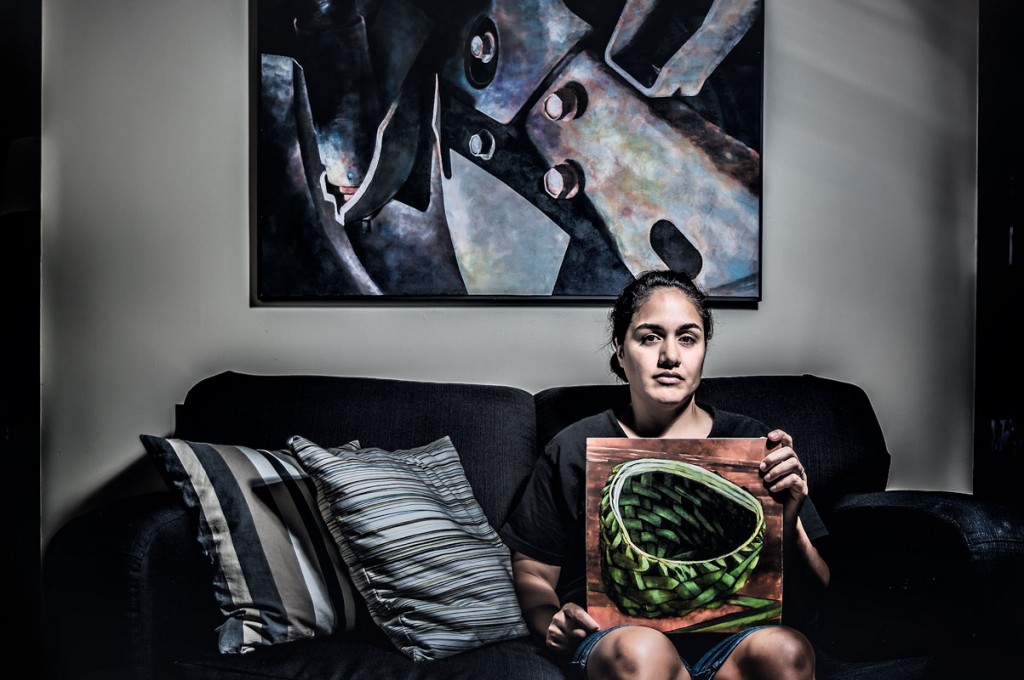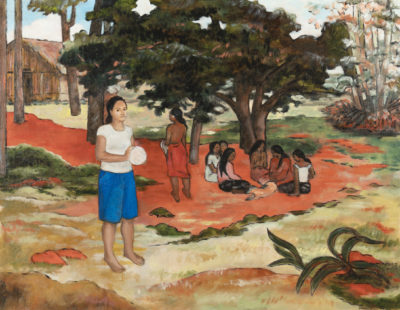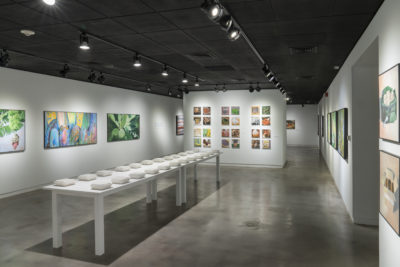
“The Girl From Hawai’i”: Tali Alisa Hafoka’s Carried Across at UMOCA
Interviews & Features
There are 24 to-go boxes aligned neatly into two rows on a white table in Tali Alisa Hafoka’s new UMOCA exhibit, Carried Across. 24 paintings adorn the wall beside the table: a can of opened Spam, a cupcake with coconut shavings piled high, sardines packed tight into a tin. Each piece represents a hallmark of Pacific Islander cuisine. “I’ve been self-conscious about not being Samoan enough or ‘cultural’ enough,” Hafoka says. “When I make art about that, it’s so easy to own it.”

Food in particular has been significant for Hafoka. “It is a connector,” she says. “The preparing, transporting, distributing and consuming of it all builds community.” For someone raised in both Laie, Hawai’i and Provo, Utah, Hafoka says her community came together earnestly to support her in-between existence. “I don’t think it was ever painful to feel like an ‘other,’” she says. “I think sorting out where I belong, what my identity is and how to introduce and describe myself has been challenging, but not in a painful way.”
“Even though I’ve never lived in Samoa, I have a kind of homesickness for it as well and a want to connect.”
Still, Hafoka says that Pacific Islanders are a small group in Utah, and it’s easy to stereotype a small group. “There’s so much commercial imagery out there declaring who we are and what our experience is—that’s hard to combat,” she says. “Disrupting that imagery and those stereotypes can make any Indigenous person, or anyone who is misrepresented or underrepresented, feel seen.”
Carried Across provides Utahns a perspective of the rich culture that surrounds them, but Hafoka says the primary audience she’s focusing on is other members of her community. A self-portrait of Hafoka as a Moana doll doesn’t just spur reflection on representation—Hafoka hopes her work can help other Pacific Islanders unlearn stereotypes. “When I think about breaking stereotypes, it’s in relation to them/us,” she says.
With both Russian-Jewish and Samoan heritage and a lifetime of living in vastly different places, Hafoka is familiar with navigating different cultural identities. “Putting things out there about the ‘in-betweenness’ of my identity feels good,” she says. “I’ve also loved making art about diasporic experience that is kind of an inside joke with other community members. I love the conversations and connections that come out of that.”
Growing up mixed went hand in hand with being different from other family members. As a result, existing in the in-between is a space in which Hafoka feels comfortable. “I think it gave us the liberty to sort of pick and choose which parts of identity we wanted to keep,” she says. “I like not feeling beholden to a mainstream.”

Art has always surrounded Hafoka, both within her family and the larger Laie community. Coming to Utah, however, was the starting point for Hafoka’s identity-centered art. “I arrived in Utah and I was ‘the girl from Hawai’i’ again,” she says. “Making art about that both felt like an expectation and also like something I needed to do.”
“Disrupting that imagery and those stereotypes can make any Indigenous person, or anyone who is misrepresented or underrepresented, feel seen.”
In Carried Across, some of the paintings reflect the Pacific Islander ideal of “giving without self-regard.” In Utah, “I” is not always “we,” Hafoka says. It’s something she’s had to be aware of when code-switching, which involves adapting to different cultural settings by swapping out one set of meanings, values and languages for another. “A lot of what I made in grad school and living away from Hawai’i came out of a longing for and wanting to feel connected to Hawai’i and my Polynesian community,” she says.
No matter where she is, Hafoka fosters connection. “I’ve lived away from Laie half of my life, but it’s still where I’ve always considered home to be,” she says. “Even though I’ve never lived in Samoa, I have a kind of homesickness for it as well and a want to connect.” Once again, food acts as a vessel: “There’s something about eating Samoan food with other Samoans when you’re all far away from Samoa that makes you feel some type of way.” Through empty to-go boxes and colorful snapshots of culture hanging on the wall, that feeling permeates Carried Across.
Stay connected with Hafoka on Instagram at @talialisahafokaart. Learn more about Carried Across, running from Sept. 30 through Jan. 7, at utahmoca.org/exhibition/tali-alisa-hafoka.
Read more artist profiles:
Embodied Ecologies: Where Disability Meets the Natural World
